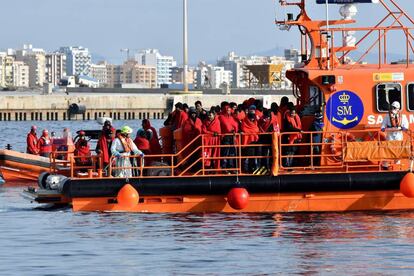Spain sees new record in migrant arrivals in 2018
Half of all undocumented migrants who made the Mediterranean crossing came to Spanish shores

The year 2018 has set a new record in Spain for migrant arrivals by sea. The number of deaths in the Mediterranean has also reached a new high.
According to the International Organization for Migration (OIM), 57,250 people managed to complete the journey to Spain across the Mediterranean between the beginning of the year and December 26. That is an average of nearly 160 arrivals a day.
Spain has become main gateway into Europe for irregular immigration from Africa, far surpassing Italy, Greece, Cyprus and Malta
This number does not include the 300 migrants who arrived in Algeciras on December 28 aboard the Open Arms humanitarian ship. This year, the Open Arms and another rescue vessel named the Aquarius brought 452 and 630 migrants to Spain, respectively.
The total for 2018 is much higher than the 39,180 arrivals registered in 2006, when there was a spike in the number of boats landing on Spanish coasts, most notably in the Canary Islands. At the time, the wave of arrivals was dubbed “the cayuco crisis,” after the makeshift vessels used by the migrants.
Fatalities
Another 769 people died or went missing on the journey across the western Mediterranean last year, more than three times the figure for 2017, according to the IOM.
So far, the new year is showing a similar trend: Spanish rescue services assisted 111 people traveling on three boats in the early hours of January 1.

The more than 57,000 arrivals in 2018 represent around half of all undocumented migrants who made the Mediterranean crossing in 2018. According to the IOM, 113,145 migrants and refugees entered Europe by sea through December 19.
This makes Spain the main gateway into Europe for irregular immigration from Africa, far surpassing Italy, Greece, Cyprus and Malta. The closed-port policies introduced by Malta and Italy, together with the agreement between the EU and Turkey, has made Spain the most attractive option, if not the safest. Last year marked a record in deaths and missing migrants, 769, a significant rise from the previous high of 631 in 2014, according to IOM data.
Amparo González, of the state-funded scientific research agency CSIC, says that many of the 57,000-plus migrants – who are mainly from Morocco, Guinea and Mali – will not settle down in Spain.
“Between and third and half of them either go elsewhere, or get deported to their home countries because they are from Algeria or Morocco. Those who don’t are from sub-Saharan Africa, and they are a minority,” she says, blaming media coverage for a widespread perception that “all of Africa wants to come to Spain.”
González notes that, by comparison, there were 31,996 migrants from Venezuela in the first half of the year alone, according to records kept by the national statistics agency INE.
The analyst Javier Aparicio Maydeu believes that the trend will continue until Europe manages to agree on a shared immigration policy. But this is an election year in Spain and in the EU, meaning that “any changes will be put on hold.”
English version by Susana Urra.
Tu suscripción se está usando en otro dispositivo
¿Quieres añadir otro usuario a tu suscripción?
Si continúas leyendo en este dispositivo, no se podrá leer en el otro.
FlechaTu suscripción se está usando en otro dispositivo y solo puedes acceder a EL PAÍS desde un dispositivo a la vez.
Si quieres compartir tu cuenta, cambia tu suscripción a la modalidad Premium, así podrás añadir otro usuario. Cada uno accederá con su propia cuenta de email, lo que os permitirá personalizar vuestra experiencia en EL PAÍS.
¿Tienes una suscripción de empresa? Accede aquí para contratar más cuentas.
En el caso de no saber quién está usando tu cuenta, te recomendamos cambiar tu contraseña aquí.
Si decides continuar compartiendo tu cuenta, este mensaje se mostrará en tu dispositivo y en el de la otra persona que está usando tu cuenta de forma indefinida, afectando a tu experiencia de lectura. Puedes consultar aquí los términos y condiciones de la suscripción digital.









































